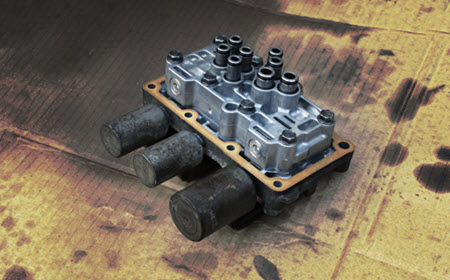A complicated system of machinery located deep within the undercarriage of your Audi allows your vehicle to change gears. Your car’s transmission system, which consists of gears, sensors, hydraulics, and fluid, enables effortless acceleration and deceleration as well as a comfortable ride. The solenoid is one of the less known components of a transmission system, but it plays a key role.
What Is a Transmission Solenoid?
Solenoids are electro-hydraulic valves that open and close in response to electrical impulses, regulating the flow of transmission fluid within the transmission system. The transmission control unit, which alerts the transmission to engage as the engine speed rises or lowers, may receive these indications from the engine, other sensors, or sometimes both. You should know that the shift solenoid plays different roles in manual and automatic transmissions.
Depending on the make and car model, automatic transmission systems typically have 2 to 5 shift solenoids. These are necessary to guarantee that the automation of gear shifting happens quickly and completely. Usually, manual transmissions lack shift solenoids. Instead, they manage when and how the gears shift using the manual clutch.
How an Automatic Transmission Shift Solenoid Functions
The shift solenoid changes the gears for you in vehicles with automatic transmissions. The transmission control unit in your automobile uses data from the engine, speed sensors, and other systems to determine when to shift gears for power, fuel efficiency, and other driving-related factors.
The shift solenoid is opened when the control unit decides that the transmission has to be moved so that transmission fluid can enter the valve body. As a result, the torque converter in the car changes hydraulic pressure sufficiently to change gears. However, since these are electro-mechanical components, they are susceptible to failure, which will prevent your vehicle from changing gears.
Transmission Solenoids’ Failure Causes
Failure of the transmission solenoid frequently results from:
- Electricity problems (for example, applying an incorrect voltage to the coil)
- The shift solenoid can become jammed open or closed due to dirty transmission fluid.
- Wear and tear – solenoids can wear out with time, just like any mechanical component or device. But proactive maintenance can counteract or reduce wear and prolong the operational life of your solenoids.
Signs Of A Poor Shift Solenoid
- Erratic or delayed gear changes: There is a very good possibility that one or even more solenoids are failing if you notice a shift delay or if your car changes gears unexpectedly.
- Jumping of gears: There’s a significant possibility that a particular solenoid is damaged or worn out if your car constantly skips over the “problem gear” every time you try to engage it.
- Getting caught in a particular gear: The transmission may become stuck if your shift solenoid breaks while a gear is engaged.
- Vehicle inefficiency: Do you notice your car moving slower than usual? Some vehicles enter Limp Mode, a safety feature for your engine that stops RPM at 2500-3000, restricts shifting, and maintains you in third gear in reaction to solenoid failures.
- Transmission warning light and the check engine light: Some modern cars have dashboard indications that let the driver know when the solenoid or transmission is having problems. Most of the time, it illuminates, and a P0700 trouble code appears. In essence, this code indicates that there is a transmission control issue.
- When you press the brakes, the engine keeps revving: There’s a strong probability you have a failing solenoid if your tachometer needle continues to climb as you apply the brakes.
Can a shift solenoid that is broken be used to drive?
It is not advised to drive your automobile with a damaged shift solenoid, even though you possibly can. Your transmission may sustain additional damage from a malfunctioning shift solenoid, which may cost more than an urgent fix.
Audi Specialist For A Shift Solenoid Failure In Birmingham
Drivers appreciate the greater performance, conveniences, and dependability that German automobiles provide.  At Momentum Motorworks, we deliver a higher standard of service than dealerships can offer Audi car owners. We are the best shop for Audi, BMW, and Mercedes owners in the Birmingham region, including Alabaster, Helena, Homewood, Mountain Brook, Hoover, and Vestavia, thanks to our dedication to quality work and customer care.
At Momentum Motorworks, we deliver a higher standard of service than dealerships can offer Audi car owners. We are the best shop for Audi, BMW, and Mercedes owners in the Birmingham region, including Alabaster, Helena, Homewood, Mountain Brook, Hoover, and Vestavia, thanks to our dedication to quality work and customer care.
We have years of expertise dealing with these vehicles, so we know the requirements for maintaining the high level of performance you need from your car. So, if your vehicle needs maintenance or you notice a problem, please call or stop by our shop immediately to make an appointment or learn more about our preventative care.
* Audi RS7 Car image credit goes to: Brandon Woyshnis.

